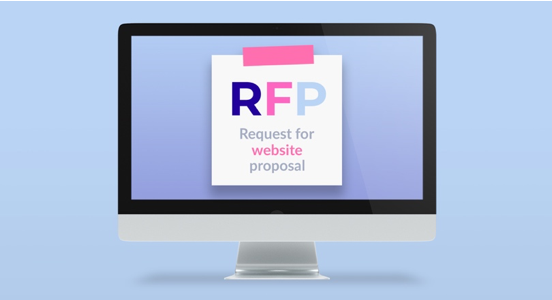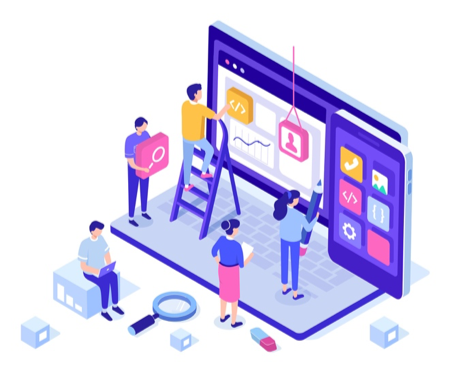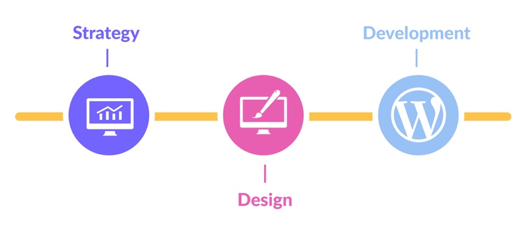

Updated January 2, 2025
When hiring a web design agency, you want to make sure your business chooses the right team to complete your project. Preparing a proposal with relevant and insightful questions can help steer your site towards success.
Updated April 28, 2022
Are you planning to redesign your website this year? Start with a website design evaluation.
Looking for a Web Design agency?
Compare our list of top Web Design companies near you
For the majority of businesses, their website plays a critical role in numerous parts of the business. From lead generation to recruitment, building a new site is a large project to undertake.
Read this: '4 Steps for Great Small Business Website Management'

Since a new site will typically last 3-5 years before the next redesign, you want to make sure it’s done right the first time.
As you evaluate proposals from different web companies, ask yourself these five questions to determine whether you are working with a trusted web team and to avoid common pitfalls.
Need help with your website? Consider hiring a trusted website designer.
One of the most important decisions you have to make is choosing which platform to build your website on.
We recommend using an open-source content management system (CMS) over a custom proprietary system.
Custom systems can be a challenge: They are typically more expensive and a bit risky. You would be dependent on the development team to resolve all issues and provide support and would have less flexibility down the line.
An open-source content management system is already built and would allow you to focus more on the content you are producing.
Choosing the right platform for your site is essential to keep your process efficient.
With a content management system, you can easily update the text and images on the site once it’s built. The most popular content management system is WordPress with more than 35% of all websites built on it. A web design and development team can design a custom site on a responsive WordPress framework, so you have both custom features and a site that can be updated easily.
With WordPress, there are thousands of developers who specialize in the system, so you can take advantage of all the extensions and plugins that are constantly being developed.
If you are building an e-commerce website, find out which platform you’ll be using for the online store. Some e-commerce platforms are stand-alone platforms and others only work on a certain CMS.
Read this: '5 Wix Alternatives for Business Websites'
For instance, WooCommerce is the most popular option for WordPress sites, whereas Shopify can’t integrate into WordPress, but works on other content management systems.
As you evaluate web agencies, ask which CMS or platform the website would be built on and make sure you work with an agency that has lots of development experience with that specific website platform.
Some businesses may consider hiring a freelancer for the web project. If you are starting a new business and need a simple site to establish a web presence, then a freelancer or a smaller agency may be a good choice since the cost will be lower.

However, if your website plays a critical role in your marketing or if it includes e-commerce and complex functionality, then it’s worth investing in a website built by an agency.
Building a high-quality website requires at least three critical skill sets: web strategy, web design, and development. When evaluating a website proposal, make sure the web team involved in the project has a specialist in each of these areas.
The web strategy phase is one of the most critical, especially for lead generation and marketing sites. A web strategist focuses on user experience and creates a blueprint or wireframe for the website, making sure the site will engage different types of web visitors.
The web designer can then take this road map and design a custom site, incorporating your branding and messaging. You should have an experienced web designer who is familiar with UX-driven design and mobile-first design.
Mobile-first means that the designer is considering how every aspect of the site will look on smaller devices. Finally, the web development team should specialize in a chosen web platform.
For WordPress, the developers should be experts in PHP, which is the server-side language that WordPress is built on.
All these different skills are required to build a professional website. It’s very unlikely to find a single person that could be an expert in all these different skills. Before committing to a project, make sure you have the right team to see it through.
Since your website will last for several years, you want to put in the work and do it right the first time.
A website project involves several steps to get to launch day. You’ll typically go through 3 to 4 phases, such as a web strategy phase, a design phase, and the development phase. You’ll also need a week or two for quality control and browser testing before the site goes live.
Quality control is a critical part of the project since there are so many devices and different browsers that the website will need to be tested on.
The timeline of a project can vary a great deal depending on the complexity of the website, the amount of content, and the custom design work involved. In general, a typical website project takes about 3-4 months. You want to make sure you think of your strategy before you move into development for the project.

Be very careful about rushing the timeline on a web project. Cutting the timeline means cutting corners in quality and functionality. If you are looking for a high-quality site, it’s unreasonable to expect anything less than 10-12 weeks.
When evaluating a web design proposal, find out what factors will impact the timeline. There is often a delay in sending the written content for the site over to the website team, which pushes back the final completion time.
The best way to stay on time and within budget with a web project is to make sure you have a clear scope of the work defined.
During the discovery phase, you can expect a web agency to ask a series of questions to identify all the deliverables and functionality of the new website. If an agency or developer asks very few questions, it could be a red flag on whether to work with that team.
There are some key factors that can impact the price of the project. Adding any complex functionality, such as a shopping cart, financial transactions, or a membership system, is a common reason for a change in scope.
Another factor that can impact pricing is the amount of design work. With a custom site, a web designer will create a certain number of custom page templates.
It’s important that you have a custom page design for your mission-critical pages on the site. These would be the most important pages, such as the home page, service page and about page. Adding more custom design templates will increase the cost of the project and extend the timeline. A lot of businesses will initially focus on the critical pages and then improve additional pages post-launch.
Even if you discuss everything possible during the discovery phase, things can come up during the web project. Make sure you understand how any changes would be handled, and what the approval process would be.
Unexpected changes are another reason why it’s important to build the site on a web platform that is flexible and easy to expand on. You may not be ready for any custom functionality right now, but you want your site to be able to grow with the business.
If your business is making the investment in a new website or major redesign, then you’ll want to protect that investment long-term. It’s easy to focus on the website itself and forget about what happens after the project, but this is an important area to consider.
Find out what type of training and support the web agency offers after the site launches. Toward the end of the project, you will typically receive training on the new site, so that your team can handle edits and content changes.
You’ll also want to talk with the web agencies about where the site will be hosted. The hosting server can affect the security and performance of the site. A lot of businesses make the mistake of placing the site on a cheap shared hosting server. Websites, especially WordPress sites, tend to perform poorly in shared environments and there are greater security risks.
Unfortunately, website security is now a concern for every business.
To secure your site, invest in 24/7 security monitoring on the server level and set up daily backups for the site. A daily backup is also helpful if you ever accidentally break something on the site. If that should ever happen, the latest backup can be easily restored.
Finally, every website needs regular maintenance to keep the collection of software, themes, and plugins running smoothly. It’s best to have a development team performing the maintenance on a monthly basis.
Some web development agencies offer web security & maintenance, but if you’re working with one that does not, you’ll want to seek out this service from an expert development company that specializes in maintaining sites built on your web platform.
Designing and building a website is a very creative process, and like any creative endeavor, you’ll see better results if you are working with a trusted partner.
As you evaluate website proposals, consider how well each potential web partner answers the 5 questions above. The proposal stage of the project also can provide insight into the web partner’s level of detail and expertise.
Finally, before you begin a website project, think about the big picture for your website, including your long-term goals. While you can always make changes to a website, it is easier to stay within the budget and timeline if your selected web team understands your needs clearly from the start.
Looking for the total package? Browse Clutch's web design packages directory.
Additional Reading:


